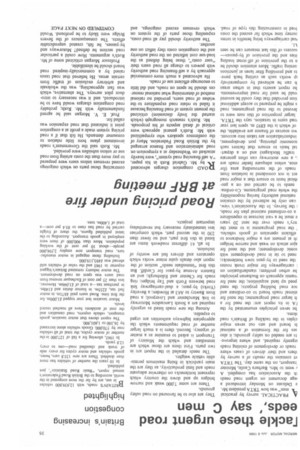rackle these urgent road eeds,' say C men
Page 37

If you've noticed an error in this article please click here to report it so we can fix it.
ett PRACTICAL survey by practical -X men" was how TRTA president Mr. e Delicate on Monday introduced a age document on urgent road needs ;h the Association has compiled. A i went to Mrs. Barbara Castle, Minister 'ransport, on the same day. The TRTA ,rt contains the results of a survey by ibers and their drivers of cases where roads or development of existing roads trgently required, and where improvets are needed on safety grounds; it also ses for the formation of a national Is board and sets out seven major ciples in the tackling of Britain's road )1ems.
he seven principles enumerated by the FA in its report are: the need for a h larger road programme; the need for Itional roads board to co-ordinate and ace road building projects; the need peed up land acquisition; the need for ,namic approach on Buchanan principles he urban problem; standardization on . carriageways for major trunk routes
the need to by-pass town bottlenecks; need to tie in road development with tomic development; and the need for ajor attack on weak and narrow bridges at present are a major hindrance to efficient operation of goods vehicles.
the road programme is to meet the itry's needs over the next 20 years e must be a vast increase in expenditure a co-ordinated national plan for roads, the Survey. In the Association's 'view, can only be achieved by the creation national authority having responsibility the whole road programme. Co-ordina needs to be carried out on a geoihical basis to ensure that a major road ect is not considered in isolation from roads of the surrounding area (for ince, unless adequate feeder roads are ., a new motorway can often generate
traffic blockages) and on a departtal basis to ensure that factors such 3conomic planning, port development, industrialization are taken into account. wo sources of finance are available, the of which is the £895 m. spent last year .oad users in taxation, says the TRTA.
larger proportion of this sum were to ievoted to the road programme, road s might be prepared to accept additional tion provided that they could be assured rould be used for road improvements. he report asserts that in urban areas h can be achieved by comparatively ip works such as cutting back pavets and providing filter lanes at junctions .urning traffic. More attention should be n to the provision of off-street loading ities and the provision of by-passes— success of this last measure can be seen U. They are also to be favoured on road safety grounds.
There are some 7,000 weak and narrow bridges up and down the country which represent bottlenecks on otherwise adequate roads and limit productivity, as they are the main yardstick in fixing maximum permissible vehicle weights.
The needs detailed in the report are in two parts. First there are those which are immediate and which the Ministry of Transport is asked to examine as a matter of urgency. Second, there is a much larger number of road requirements which the appropriate highways authorities are urged to expedite.
Among the new roads listed as urgently required are a South Lancashire Motorway to link Manchester and Liverpool; a road from Bawtry to A63 at Howden; a Beverley (Yorks) by-pass; a dual-carriageway link road between Forth and Tay bridges; ring roads for Chester and Edinburgh; and an Eastern Avenue by-pass for Cardiff. But this first "immediate needs" section of the report also details quite minor works which operators and drivers feel are worthy of inclusion.
In all, 61 different roadwork items are fisted in this first part, and no fewer than 230 in the second part, which comprises less immediately necessary but nevertheless important projects.




























































































































